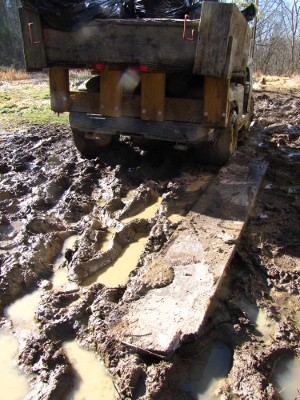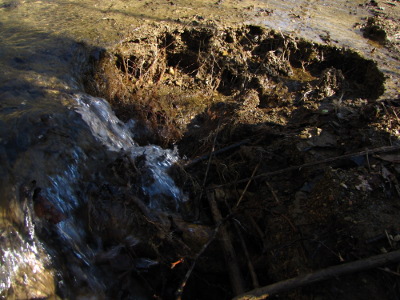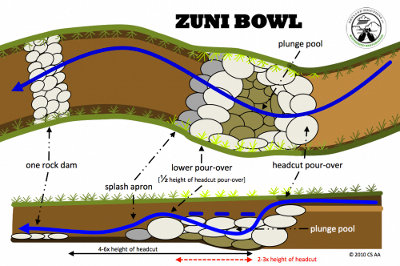
Managing water in a wet climate
 I read a lot of blogs and
books that talk about water management. The problem is, they're
all tailored toward arid climates, where you need to work hard to
capture any rain that falls and store it in your soil for later dearths.
I read a lot of blogs and
books that talk about water management. The problem is, they're
all tailored toward arid climates, where you need to work hard to
capture any rain that falls and store it in your soil for later dearths.
Our water management
issues are very different. The badly eroded soil of the forest
garden becomes so waterlogged that algae grows in puddles even during
the winter. Our gutterless trailer pours so much water off the
sides that the soil is sodden, and simple foot traffic is enough to
turn the ground into a morass.
Meanwhile, our two
creeks are clearly eroding more than they should. The big creek
was straightened by some foolish farmer a few decades ago, and even
though I know channeling it back into its original meander would slow
the flow, I'm afraid to undertake such a huge project.
 The
smaller creek has dug itself so deep that that the lower portion has
vegetationless banks four feet tall. As I was gathering leaves in
the woods, I noticed that the tree that had been holding back the
advance of the headcut was losing the battle.
The
smaller creek has dug itself so deep that that the lower portion has
vegetationless banks four feet tall. As I was gathering leaves in
the woods, I noticed that the tree that had been holding back the
advance of the headcut was losing the battle.
I suspect all of these
problems are really opportunities if considered from a permaculture
standpoint. I've been raising up the forest garden with
hugelkultur mounds, and the rotting wood releases enough water a bit at
a time that I was
able to grow tomatoes there without irrigating last summer. Gutters on the East
Wing would clear up the worst path morass, channeling the water into
one of our IBC tanks to allow us to experiment
with aquaponics. Maybe the small creek could be mended with a Zuni
bowl and some homemade
meanders. And
one of these days I'd like to create a little pond.
 But I don't want to dive into
any water management project without a bit more information. Do
you have any books you would recommend for permaculture style water
management in wet landscapes? I'm looking for an inspiring print
source that shows how to work with water on a small scale with no heavy
machinery. (You can recommend websites too, but I'm unlikely to
read them deeply --- I have a mental block against getting in depth
information off the internet.)
But I don't want to dive into
any water management project without a bit more information. Do
you have any books you would recommend for permaculture style water
management in wet landscapes? I'm looking for an inspiring print
source that shows how to work with water on a small scale with no heavy
machinery. (You can recommend websites too, but I'm unlikely to
read them deeply --- I have a mental block against getting in depth
information off the internet.)
Want more in-depth information? Browse through our books.
Or explore more posts by date or by subject.
About us: Anna Hess and Mark Hamilton spent over a decade living self-sufficiently in the mountains of Virginia before moving north to start over from scratch in the foothills of Ohio. They've experimented with permaculture, no-till gardening, trailersteading, home-based microbusinesses and much more, writing about their adventures in both blogs and books.
Want to be notified when new comments are posted on this page? Click on the RSS button after you add a comment to subscribe to the comment feed, or simply check the box beside "email replies to me" while writing your comment.

Drake --- Milkwood is the blog that's got me thinking about the topic. But they're in a totally different climate, and I've learned not to mindlessly mimic Australian water management advice. It tends to turn my already waterlogged yard into a bigger mess.
Ikwig --- You'll definitely hear about it as we experiment! It sounds like you have a lot of the same land management issues we do.
It is a pleasure for me to read your initial study of managing water. All I know on the topic came from watching the documentary Blue Gold. I mention it so your movie watching readers can check it out. I would love to see you write more about wet climate water management in particular.
It is neat for me to read about your understanding of your few acres as a specific local area to manage.
Start from the place where water flows away from your property. That will be the creeks and possible underground streams. The size of those streams yields a maximum drain capacity. But unless the creeks are regularly filled to overflowing, that shouldn't be the bottleneck.
Then look at your soil. The soil is both water storage and drain medium. The big questions is what is limiting the flow of te water here? Is it the permeability of the soil itself, or are there inpenetrable layers below the surface that prevent drainage. From your pictures, it looks like the first.
If that is true, you need to enlarge the draining capacity of the land. The time-honoured and low-tech solution in these parts of the world (and we know about having too much water; our whole country is basically a delta of several rivers) is to dig small, regularly spaced, drainage trenches leading to the creeks or to bigger channels leading to the creek. It is easier for water to flow through an open channel than to permeate through the soil. Digging a small trench every 30 feet or so should help a lot. If not, halve the spacing and repeat if necessary. Of course you have to orientate them sensibly, since water has trouble flowing uphill. All you need for this is common sense, a shovel and elbow grease. The size of the channels needs to be tuned to the slope of the land. You can measure that with a spirit level and markers on trees. You want to keep the speed of the flow through the channels low to prevent erosion. If the speed is too high, make the trench wider and put rocks or zuni bowls in as flow barriers.
All you need for this is common sense, a shovel and elbow grease. The size of the channels needs to be tuned to the slope of the land. You can measure that with a spirit level and markers on trees. You want to keep the speed of the flow through the channels low to prevent erosion. If the speed is too high, make the trench wider and put rocks or zuni bowls in as flow barriers.
Another option (which is much more work I think) is to increase the permeability of your soil itself. That means mixing other stuff in that drains better.
My guess would be that a combination of drainage trenches and soil improvement would be the winner.
Maggie --- Good call! I seem to have an even bigger mental block against movies than against websites, but I'll bet that'll help some people.
Stephanie --- I haven't gone to talk to them, but I suspect you're right that the soil and water conservation service would be helpful. I was hoping for something less official and more permaculture-themed. I'm not really sure what I think the difference would be, though...
Roland --- Ditches are the traditional way of draining fields. What I'm unsure of is whether they're really good for the whole watershed. (Maybe, to link this to my note to Stephanie above, that's why I want a permaculture source, not the government information.) You would think that ditches would push more water into the streams faster, which would keep your fields drier but would also make the streams prone to flooding and erosion.
I feel like even though we have too much water at certain times of the year, we have too little at other times. What I'd like is to figure out a way of evening that out --- maybe draining land into a pond that could be used to water the garden in the summer? Or draining water into a organic matter-filled trough that naturally feeds water into surrounding areas later?
Ditches are used to manage the height of the water table. If you make a dam or adjustable sluicegate in the ditch, water will only flow out until it reaches the top of the dam or gate. So the ditches act both as drainage channels and reservoirs. The water table will stabilize on that level. (Insofar as a situation with varying rain and evaporation can be termed stable.)
This works best on a flat field, so you can have a fairly constant depth of the water table below ground. If your garden has a lot of relief, you either need to take into account which plants you put in which parts of the garden (since the depth of the water table will vary a lot) or you have to build terraces.